Bridging The Fringes: What It’s Like Delivering Hope During a Pandemic
Others, Addictions , COVID-19Contributed by: Union Gospel Mission
We never know what we are going to find when we jump inside our rescue vehicle and set out for the day. All we do know is that people always need help, and they need help now more than ever.
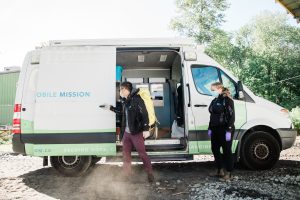
A day as an Outreach Worker at Union Gospel Mission means that we are driving our Mobile Mission rescue van to hard-to-find areas in suburbs across the Lower Mainland, searching for people living with homelessness out on the fringes. Some are in desperate need. Meeting people who are deeply struggling gives you a glimpse into another side of the human experience. It’s joyful, heartbreaking, exhausting and life-giving all at the same time. Nothing highlights this more than our first stop:
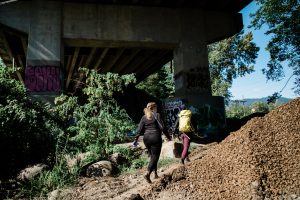
Today on our route, with a van full of survival gear, food and practical supplies for people in need, we head underneath one of the busy bridges. There’s a few camps here – an initial few tents on a concrete slab underneath the bridge itself and a bigger established camp to the side of the bridge, deeper into the woods across some train tracks. There’s a group of people we’ve gotten to know well here and I’m excited to see them again. Their camp is far from resources and support. But they know it as ‘home.’
When we pull up and step out, the smell of dust and metal meets us. We find that the camp is a lot smaller than the last time we were there and a few people have moved out.
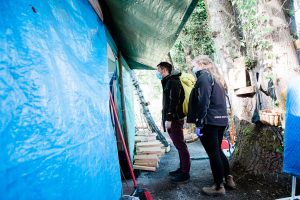
Our friend Eli* is there and he’s glad to see us. He’s an easy-going guy who loves playing basketball. We met him a few months ago, after someone brought him here to their camp when he was in bad shape and helped him get better.
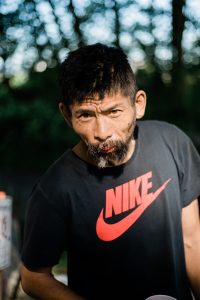
Bridging the Fringes Caption: *Eli, who we are using a pseudonym to protect his privacy, on a recent Mobile Mission visit.
Eli is eager to come back to the van with us to grab a drink and chat for a few minutes. With cars rushing by above, he tells us how he’d just gotten used to this area and memorizing where he could go when the pandemic hit but now everything has changed.
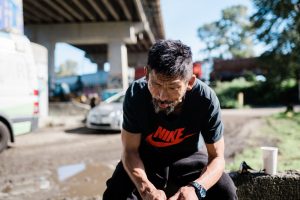
It’s been harder for our friends like Eli during this pandemic. Many services they’ve relied on have changed or shut down, and there’s lots of fear and anxiety about where they can get what they need. Some people are scared of sleeping in tight shelter spaces and so they’ve gone out further to socially distance. We’re now seeing over twice as many people as we did before the pandemic. That’s why we’re out here the same time each week – to bring some consistency when life is unpredictable, and so they know we care and haven’t forgotten them.
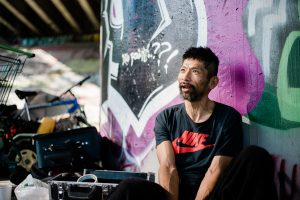
Eli often feels there’s stigma for people like him who use drugs, are homeless, or struggle with mental illness:
“People are very lonely, they just want someone to talk to. But nobody listens and cares. Or they’re just not able to cuz they don’t have the time and are focused on their lives. No one thinks twice about it, other than you guys!”
As hard as this is to hear, Eli tells us that having us there getting to know him has built up trust:
“When you guys came I wasn’t in any shape to talk to you cuz I was so dilapidated in every way. But you guys have made the effort to come out, and so it’s nice.”
As we drive away, it feels like there’s this invisible thread connecting me to Eli and the other people we’ve met along the way, like they’re still right there beside me. The rejection and loneliness in their eyes sinks deep into the pit of my stomach and I feel that our friendship means more to them than I will ever know.
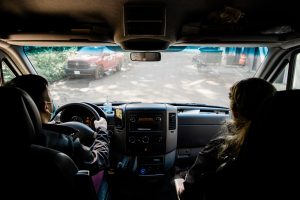
I reflect on how important relationships are with our guests, especially now that there are more Eli’s out there than ever before, who are just on our doorstep – out of sight, but easy enough to find if we only take the time to look.
People like Eli need our help and connection more than ever before. We get to be a part of someone’s life and give them a chance to be heard and listened to on a regular basis. That builds up trust in their lives and ultimately, connection to our long-term programs like shelter, recovery, housing, and a renewed life. I hope they can see and feel God’s love for them through our actions and be blessed by that.
We can all take time to get to know people like Eli who feel like they’re on the outside, to listen and show that we see them and that we care.
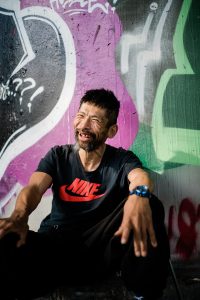
– By Anmari Wilde, UGM Outreach Worker with Rachael Allen, UGM Media & Communications Officer
For $23.77, you can help a homeless neighbour receive food, survival essentials, and crucial connection through our Mobile Mission. Your gift could change the life of someone struggling to survive on the fringes. Please give generously at UGM.ca/donate.
Original article found at: https://www.ugm.ca/bridging-the-fringes-what-its-like-delivering-hope-during-a-pandemic/

